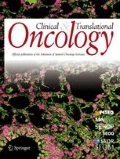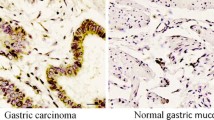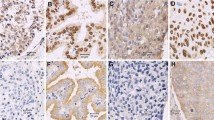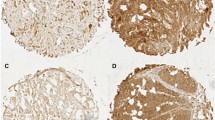Abstract
Backgrounds
A disintegrin and metalloproteinase (ADAM) 17 has been indicated to be an indispensable regulator of cellular events from proliferation to migration. Although prognostic importance of ADAM17 expression has been investigated in several tumours, its clinical utility as a useful prognostic molecular marker remains unclear in gastric cancer. In the current study, we evaluated the expression of ADAM17 and its prognostic significance in gastric cancer patients after curative gastrectomy.
Methods
The prognostic significance of ADAM17 expression was analysed immunohistochemically in 156 patients with gastric cancer who had undergone curative gastrectomy, and the relationship between its expression and clinicopathological factors was also evaluated.
Results
High ADAM17 expression was detected in 79 patients (51 %), whereas low expression was found in 77 cases (49 %). There was significant correlation between gender, histology, lymph node metastasis, vascular invasion, the presence of recurrence and high ADAM17 expression. Recurrence in patients with high ADAM17 expression was significantly higher than that for patients with low ADAM17 expression (p = 0.032). The median disease-free survival (DFS) time for patients with tumours with high ADAM17 expression was worse than that of patients with tumours with low ADAM17 expression (16.6 vs. 44.2 months, p = 0.004). In addition, patients with low ADAM17 expression had a higher median overall survival (OS) (49.6 vs. 26.9 months, p = 0.019) compared to those with high ADAM17 expression. Multivariate analysis indicated that the rate of ADAM17 expression was an independent prognostic factor for DFS, in addition to the already known important clinicopathological prognostic indicator. But the prognostic importance of ADAM17 expression could not be proved by multivariate analysis for OS.
Conclusions
The potential value of ADAM17 expression as a useful molecular marker in gastric cancer progression should be evaluated comprehensively; it may predict recurrence and poor prognosis in patients with gastric cancer after curative resection.



Similar content being viewed by others
References
Siegel R, Naishadham D, Jemal A. Cancer statistics, 2013. CA Cancer J Clin. 2013;63:11–30.
Kamangar F, Dores GM, Anderson WF. Patterns of cancer incidence, mortality, and prevalence across five continents: defining priorities to reduce cancer disparities in different geographic regions of the world. J Clin Oncol. 2006;24:2137–50.
Blobel CP. ADAMs: key components in EGFR signaling and development. Nat Rev Mol Cell Biol. 2005;6:32–43.
Edwards DR, Handsley MM, Pennington CJ. The ADAM metalloproteinases. Mol Asp Med. 2008;29:258–89.
Gooz M. ADAM-17: the enzyme that does it all. Crit Rev Biochem Mol Biol. 2010;45(2):146–69.
Duffy MJ, McKiernan E, O’Donovan N, McGowan PM. Role of ADAMs in cancer formation and progression. Clin Cancer Res. 2009;15:1140–4.
Rose-John S. ADAM17, shedding, TACE as therapeutic targets. Pharmacol Res. 2013;71:19–22.
Shou ZX, Jin X, Zhau ZS. Upregulated expression of ADAM17 is a prognostic marker for patients with gastric cancer. Ann Surg. 2012;256(6):1014–22.
Zhang TC, Zhu WG, Huang MD, Fan RH, Chen XF. Prognostic value of ADAM17 in human gastric cancer. Med Oncol. 2012;29(4):2684–90.
Edge SB, Byrd DR, Compton CC, et al., editors. American Joint Committee on Cancer Staging Manual. 7th ed. Springer, New York; 2010. p. 117.
Japanese Gastric Cancer Association. Japanese classification of gastric carcinoma. 2nd English ed. Gastric Cancer. 1998;1:10–24.
Katakowski M, Jiang F, Zheng X, Gutierrez JA, Szalad A, Chopp M. Tumorigenicity of cortical astrocyte cell line induced by the protease ADAM17. Cancer Sci. 2009;100:1597–604.
Arribas J, Bech-Serra JJ, Santiago-Josefat B. ADAMs, cell migration and cancer. Cancer Metastasis Rev. 2006;25:57–68.
Zheng X, Jiang F, Katakowski M, Zhang ZG, Lu QE, Chopp M. ADAM17 Promotes breast cancer cell malignant phenotype through EGFR-PI3K-AKT activation. Cancer Biol Therapy. 2009;8(11):1045–54.
Borrell-Pages M, Rojo F, Albanell J, Baselga J, Arribas J. TACE is required for activation of the EGFR by TGF-alpha in tumors. EMBO J. 2003;22:1114–24.
McGowan PM, Ryan BM, Hill AD, McDermott E, O’Higgins N, Duffy MJ. ADAM-17 expression in breast cancer correlates with variables of tumor progression. Clin Cancer Res. 2007;13:2335–43.
McGowan PM, McKiernan E, Bolster F, Ryan BM, Hill AD, McDermott EW, et al. ADAM-17 predicts adverse outcome in patients with breast cancer. Ann Oncol. 2008;19:1075–81.
Conflict of interest
This manuscript was not supported by any financial or other relationships.
Author information
Authors and Affiliations
Corresponding author
Additional information
This study was presented in ASCO, 2015, Gastrointestinal Cancer Symposium, in a poster session. January 15–17, 2015, San Francisco, California.
Rights and permissions
About this article
Cite this article
Aydin, D., Bilici, A., Yavuzer, D. et al. Prognostic significance of ADAM17 expression in patients with gastric cancer who underwent curative gastrectomy. Clin Transl Oncol 17, 604–611 (2015). https://doi.org/10.1007/s12094-015-1283-1
Received:
Accepted:
Published:
Issue Date:
DOI: https://doi.org/10.1007/s12094-015-1283-1




